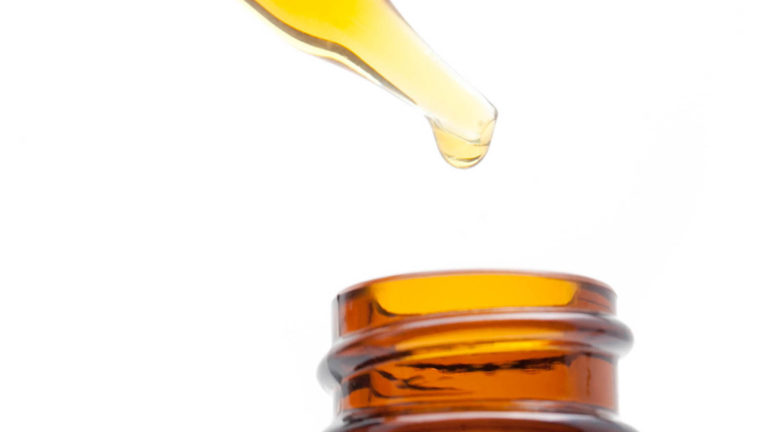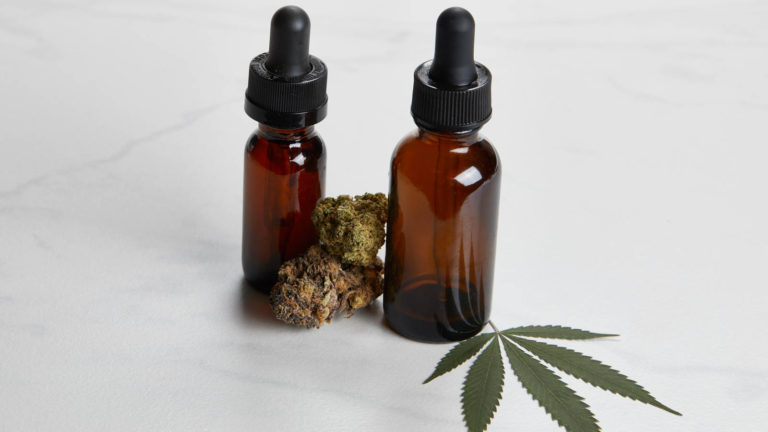CBD oil derived from hemp is legal in Delaware, with CBD products available for purchase throughout the state. In addition to hemp-derived CBD products that can be purchased over-the-counter, Delaware has also had a medical marijuana program since 2011 with the passage of the Delaware Medical Marijuana Act. Eligible patients can buy CBD oil derived from cannabis, along with cannabis products containing both CBD and THC.
Adult-use cannabis remains illegal, although in 2015,House Bill 39 decriminalized the possession and private use of up to one ounce of cannabis. In 2019, the bill was expanded to decriminalize juvenile possession of one ounce or less.
What is CBD?
CBD is a non-intoxicating cannabinoid found in cannabis. After tetrahydrocannabinol (THC), cannabidiol (CBD) is the second-most abundant cannabinoid in the plant, and has many potential therapeutic benefits, including anti-inflammatory, analgesic, anti-anxiety and seizure-suppressant properties. CBD can be sourced from both marijuana plants and hemp plants, which are legal in most countries as they contain minuscule amounts of THC.
 Photo by: Gina Coleman/Weedmaps
Photo by: Gina Coleman/WeedmapsImage lightbox

Combine THC and CBD to fully employ the entourage effect; THC and CBD work hand-in-hand to amplify each others' effects.
Why is CBD sometimes illegal?
All types of cannabis, including hemp strains that don't produce enough THC to cause intoxication, were considered illegal under the Federal Controlled Substances Act of 1970. The law categorized all cannabis as Schedule I, which defined the plant as a highly addictive substance with a high potential for abuse and no accepted medical use.
The Hemp Farming Act of 2018 re-classified hemp as an agricultural commodity and made its cultivation federally legal. Further, the act removed some forms of cannabis from Schedule I status by creating a legal distinction between hemp and marijuana. Hemp is cannabis with less than .3% THC, and marijuana refers to cannabis with more than .3% THC. This distinction in federal law effectively legalized CBD that is derived from cannabis with less than .3% THC, as long as it has been cultivated according to federal and state regulations.
The 2018 Hemp Farming Bill legislation does not mean that CBD derived from hemp is universally legal throughout the United States. According to the Hemp Farming Bill, the Food and Drug Administration (FDA) has the power to regulate CBD product labeling, including therapeutic claims and the use of CBD as a food additive.
The FDA has declared that even hemp-derived CBD may not legally be added to food and beverages, or marketed as a dietary supplement. Although the organization has begun to re-evaluate some of these stances on legal CBD products, the FDA has not revised its regulations. The agency also has been strict in its position against any labeling that could be perceived as a medical claim about CBD products.
In addition to federal regulation of CBD, the Farm Bill also gave states the option to regulate and prohibit the cultivation and commerce of CBD. States may also regulate CBD in food, beverages, dietary supplements, and cosmetic products independently, even before the FDA finalizes its policies.
In March of 2020, the FDA released guidelines for manufacturers, processors, and vendors of hemp-derived CBD products.
Delaware CBD laws
Delaware cannabis legislation bears infrequent mention to CBD. Medical marijuana was legalized in the state in 2011, under theDelaware Medical Marijuana Act. Under the state's medical marijuana program, patients with a qualifying health condition and a medical marijuana card can purchase CBD products derived from marijuana.
 Photo by: Gina Coleman/Weedmaps
Photo by: Gina Coleman/WeedmapsImage lightbox

According to the act, cannabis-derived CBD oil must contain at least 15 percent CBD but no more than 7 percent THC, or must be a dilution that contains at least 50 milligrams of CBD per milliliter, and no more than 7 percent THC.
Hemp cultivation was legalized in Delaware in 2014. House Bill 385, which was informed by the 2014 Farm Bill, allowed for the production of industrial hemp strictly for research purposes. Hemp is defined as any part of the Cannabis sativa L. plant, including the seeds, derivatives, extracts, cannabinoids, isomers, acids, salts, salts of isomers, with no more than .3% THC on a dry weight basis.
The provisions of House Bill 385 were expanded in 2018 with the passage of Senate Bill 266, which was approved several months before the 2018 federal Farm Bill was signed into law. This bill endowed the Delaware Department of Agriculture with the authority to adopt and change hemp-related laws to align with federal rules and policies. The act positioned Delaware to permit the industrial cultivation of hemp when federal restrictions were repealed following the 2018 Farm Bill.
Delaware is awaiting approval for its state hemp plan from the USDA. Although no commercial production of hemp is permitted in the interim, growers can still legally produce hemp under the Delaware Hemp Research Pilot Program.
Delaware hemp legislation makes no specific reference to CBD, which has resulted in a relatively unrestricted and unregulated hemp-derived CBD market.
Licensing requirements for CBD
The Delaware Department of Agriculture is responsible for licensing hemp cultivation and production in the state. Those who are interested in cultivating hemp must apply through the Hemp Research Pilot Program, which requires the grower to establish a research agreement with an appropriate approved institution.
Those who apply must provide fingerprints and a background check. Approved and authorized applicants can collect hemp seed from the Delaware Department of Agriculture. A department representative must be notified at least 15 days before the harvest to sample the crop for THC levels.
Delaware also has a program in place to grant licenses for the processing of hemp.
Delaware CBD possession limits
There are no limits on hemp-derived CBD possession in Delaware.
 Photo by: Gina Coleman/Weedmaps
Photo by: Gina Coleman/WeedmapsImage lightbox

Eligible patients accessing CBD through the state's medical marijuana program are permitted to purchase a limit of three ounces every two weeks.
There is currently no specific legislation outlining the penalties for possession of cannabis-derived CBD. There is, however,a sliding scale of penalties for those found in possession of more than one ounce of cannabis. The possession of less than one ounce of cannabis without a medical marijuana card is considered a civil offense, punishable by a fine of no more than $100. Possession of more than one ounce up to 175 grams of cannabis is a misdemeanor punishable by up to three months in jail and a fine of up to $575. Possession of more than 175 grams of cannabis is considered a felony offense and may be punishable by up to three years in jail.
Where to buy CBD in Delaware
CBD products derived from hemp can be found throughout Delaware in retail outlets such as convenience stores, health food stores, coffee shops, and a growing number of CBD-specific retailers.
CBD products derived from cannabis are only available from authorized dispensaries.
Shopping online for CBD represents another option for purchase. Consumers can buy from a wide variety of online outlets for CBD products, read consumer reviews, and ship purchases to their homes.
Online shopping also offers the ability to gather detailed information about each product, compare different products and product types, and compare CBD products based on price. CBD brands often also have their own ecommerce shop, allowing the consumer to purchase their desired CBD products straight from the source. Find out more about where to purchase CBD.
How to read CBD labels and packaging
The 2018 Farm Bill shifted the oversight of hemp and hemp-derived products from the U.S. Department of Justice (DOJ) to the U.S. Food and Drug Administration (FDA). The FDA does not presently allow CBD-infused food, drinks, or dietary supplements to be sold, and hasn't yet provided regulations for hemp-derived CBD products.
Still, the agency warns that regulations in flux still require companies to make legitimate claims on their labels. Buyers should nonetheless approach CBD products with caution, and take necessary precautions such as doing some research before making a purchase to ensure the CBD comes from a reliable source. Most reputable CBD producers typically include the following information on their CBD product labels:
- Amount of active CBD per serving.
- Supplement Fact panel, including other ingredients.
- Net weight.
- Manufacturer or distributor name.
- Suggested use.
- Full-spectrum, broad-spectrum, or isolate.
- Batch or date code.
One of the most important things to pay attention to is whether a CBD product is full-spectrum, broad-spectrum, or isolate.

